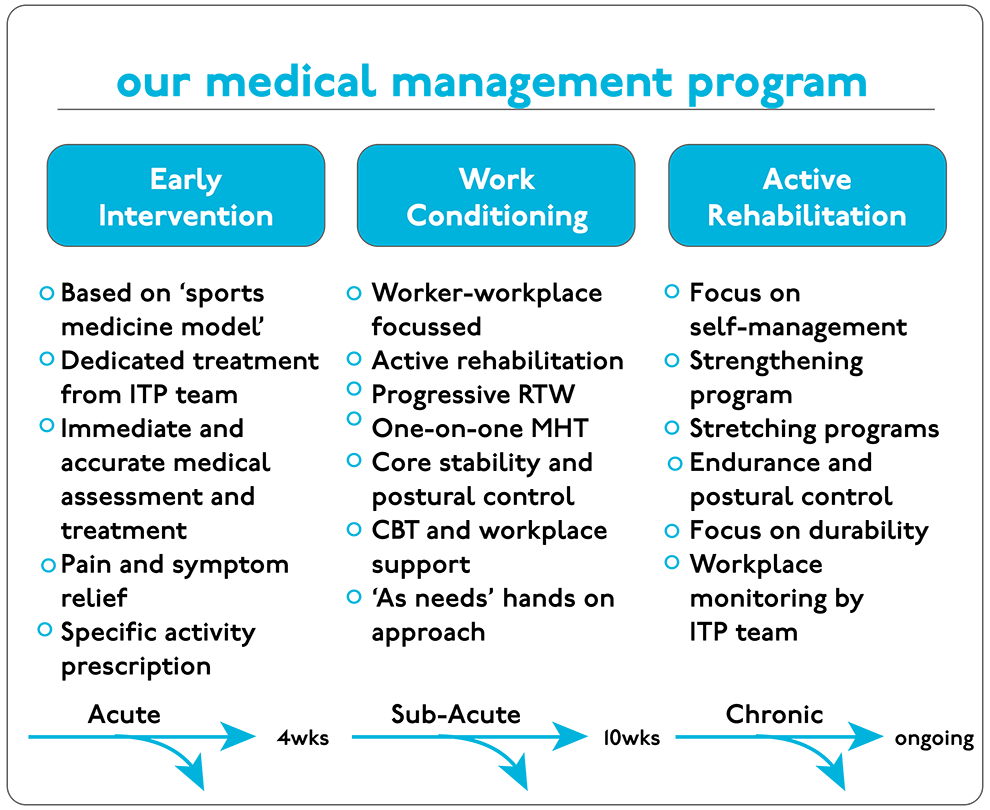Our Medical Management Program encompasses early intervention, work conditioning and active rehabilitation. Across these areas, ITP maintains its core philosophy of open and collaborative communication with all key stakeholders to ensure an early, safe and durable return to work.
Injury Management
Our Medical Management Program

Our physiotherapists will provide an early accurate diagnosis of injuries or musculoskeletal problems and timely implementation of appropriate treatment for injured workers. Where necessary we will provide the relevant referral to other health professional or service providers to achieve the best outcomes.
The provision of immediate onsite ‘hands on’ physiotherapy treatment combined with education and rehabilitative exercises will aid a more rapid recovery and prevent long term disability and work loss. This in turn has been proven to improve health, social, financial outcomes for all parties involved. Our interventions are always implemented in accordance with current evidence-based and best-practice guidelines.
Our detailed assessment that considers physical, psychosocial and environmental factors, including workplace organisation, facilitates early accurate diagnosis and identification of the worker’s needs.
Our physiotherapists will take a detailed history from the injured worker; assess the worker’s capabilities and tolerances, as well as a thorough assessment of their work tasks.
Assessment in the workplace to determine a worker’s capabilities to perform required tasks and also assist in addressing any workplace issues. Through the analysis of the workplace environment and the duties of employment we bridge the gap between physical capability and inherent requirements of the role to ensure sustainably safe employment, with education and suitable aids providing necessary reinforcement.
Assessment to determine an individual’s current physical abilities to perform their work.
Through these detailed assessments we will determine:
- The rehabilitation needs of the injured worker
- The worker’s pain attitudes, beliefs, and recovery expectations
- The worker’s physical and mental health, social situation and job satisfaction
- The role requirements, with consideration of pre-injury duties and hours
- Suitable work duties and hours that facilitate recovery
- Appropriate steps for a tailored RTW plan and rehabilitation progress
- Barriers to RTW, and suggestions on how to address these
Early RTW and work maintenance are associated with better health outcomes for injured workers and this is a high priority of the ITP team. Research has found greater RTW success with programs that include workplace arrangements providing support, equipment, activities or modifications to help sustain and progress work functions and productivity.
Overwhelming medical evidence indicates that targeted education and self-managed active rehabilitation yield the fastest and most sustainable return to full capacity. Providing active rehabilitation, rather than simply the provision of symptomatic relief is an effective way of speeding up RTW and reducing work loss in the longer term. Our active rehabilitation includes advice on graded physical exercise and early resumption of activities using a cognitive behavioural approach.
Education is always targeted to meet the specific needs of the worker and to be consistent with promoting independence and self-management. The worker’s compensation system is often confusing for workers and this may increase levels of stress which can adversely impact on their recovery. Our physiotherapists are able to inform, educate, guide and support the worker to restore function and achieve timely and effective RTW.
Our team of physiotherapists are committed to working within a collaborative multidisciplinary approach that supports cost-effective and evidence-based RTW management of injured workers. Clear and consistent communication and active involvement of all stakeholders in decision-making and planning assists the RTW process. Conflicting stakeholder advice can enhance fear and avoidance.
RTW has been shown to be 2.4 times faster following workplace intervention. Current literature shows that the best RTW results come from a combination of a workplace intervention involving a worksite ergonomic assessment and a clinical intervention involving a multidisciplinary work rehabilitation program. Our physiotherapists consider employee, management and industrial issues in the workplace and adopt strategies to address these issues if they are barriers to the worker’s RTW.
Work and ADL specific exercise and education programs designed to improve an individual’s ability to meet and exceed the physical demands of their job. ITP is committed to returning employees to a more resilient and stronger condition than prior to injury – we believe that employees need to exceed the physical requirements of their role rather than simply match them.
Our programs are specific to the injury and tailored to each individual and their role.
Our comprehensive monitoring and review process includes communication with all stakeholders at regular intervals. As the primary treatment practitioner our physios lead the discussion at case conferences seeking input from the employer, employee, insurer and doctor. We drive toward defined RTW goals and timeframes.
Regular monitoring and review of the injured worker’s progress against defined RTW goals and risk factors is a recognised service delivery and quality assurance need. Our physiotherapists have the necessary skills to observe the worker’s progress, or lack thereof, in their rehabilitation and match suitable duties to the injured worker’s capabilities.
Evaluation of RTW success is based on successful return to and maintenance of pre-injury duties and hours, and maintenance of functional gains. Our physiotherapists ensure the effectiveness of RTW processes is regularly evaluated using appropriate outcome measures, with the objective of continuous improvement.
Where an employee is unable to return to their pre-injury role, and all options have been exhausted, ITP will undertake a Vocational Assessment to assist the employee and the employer to identify alternative occupations or training of interest. We work hand-in-hand with the doctor, insurer, employee and employer to produce the most valuable outcome.






